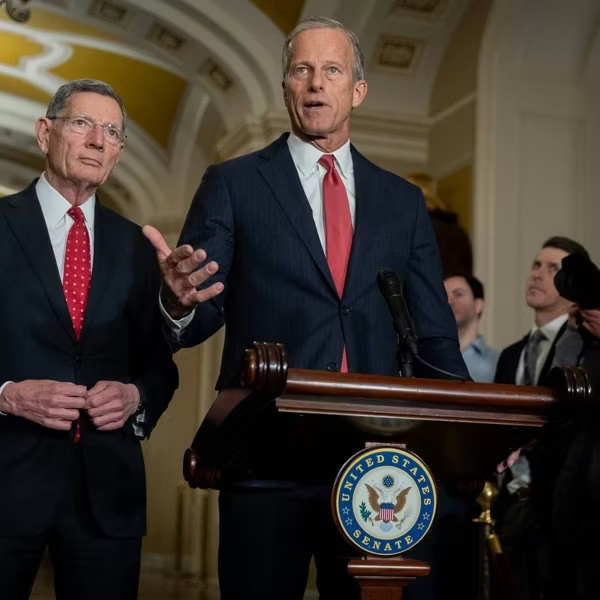
House Speaker Paul Ryan (R-Wisc.) and his colleagues have promoted their tax plan as a win for middle-class families, but analysis shows otherwise. (Photo: @ChicagoTribune/Twitter)
Yet Another Analysis Shows How Trump-GOP Tax Scam Will Bury Middle Class
"The GOP tax plan is a simple political statement about who matters more in American democracy: the heirs to hedge fund fortunes or everyone else in the country."
Critics of the Republican tax plan say it offers a crystal-clear view of which Americans matter to the Trump administration and the Party in control of Congress--and which don't. Despite an aggressive push to portray the proposal as a tax cut for middle-class Americans, according to a New York Times analysis, millions of middle-income families would pay more in taxes immediately--and many more would see their tax bills rise over time.
"The GOP tax plan is a simple political statement about who matters more in American democracy: the heirs to hedge fund fortunes or everyone else in the country," wrote Zach Carter in the Huffington Post on Monday. "Trump and the Republicans have chosen the dynasts."
The analysis by the Times, similar to one shown by the Institute of Taxation and Economic Policy (ITEP), finds that 45 percent of middle-class Americans would be paying more in taxes within a decade, even if they see some modest relief initially. As theTimes notes, it's "a striking finding for a bill promoted as a middle-class tax cut."
Due to the elimination of personal exemptions, which allows many taxpayers to deduct $4,000 per household member, the tax plan would immediately be costly for many families with children. According to the Times, "Fewer than 40 percent of middle-class families with at least three children would receive a tax cut under the plan, compared with nearly 80 percent of families without children."
Households with large medical bills would be hit hard in 2018 as well, following the proposal's elimination of medical expenses deductions. Overall, about a third of middle-class families would pay more in 2018 than they do now--far from the rescue package House Speaker Paul Ryan (R-Wisc.) portrayed the tax plan as last week.
"These are matters of justice, social prestige, and political power," Carter wrote in the Huffington Post, regarding the GOP's insistence on . "There is no economic law that governs how the $19 trillion [in national wealth] we produce each year must be distributed. Figuring out who should get how much of that $19 trillion is a political choice--and the Republicans' choice is to give much of that money to a few hundred financial dynasties."
An Urgent Message From Our Co-Founder
Dear Common Dreams reader, The U.S. is on a fast track to authoritarianism like nothing I've ever seen. Meanwhile, corporate news outlets are utterly capitulating to Trump, twisting their coverage to avoid drawing his ire while lining up to stuff cash in his pockets. That's why I believe that Common Dreams is doing the best and most consequential reporting that we've ever done. Our small but mighty team is a progressive reporting powerhouse, covering the news every day that the corporate media never will. Our mission has always been simple: To inform. To inspire. And to ignite change for the common good. Now here's the key piece that I want all our readers to understand: None of this would be possible without your financial support. That's not just some fundraising cliche. It's the absolute and literal truth. We don't accept corporate advertising and never will. We don't have a paywall because we don't think people should be blocked from critical news based on their ability to pay. Everything we do is funded by the donations of readers like you. Will you donate now to help power the nonprofit, independent reporting of Common Dreams? Thank you for being a vital member of our community. Together, we can keep independent journalism alive when it’s needed most. - Craig Brown, Co-founder |
Critics of the Republican tax plan say it offers a crystal-clear view of which Americans matter to the Trump administration and the Party in control of Congress--and which don't. Despite an aggressive push to portray the proposal as a tax cut for middle-class Americans, according to a New York Times analysis, millions of middle-income families would pay more in taxes immediately--and many more would see their tax bills rise over time.
"The GOP tax plan is a simple political statement about who matters more in American democracy: the heirs to hedge fund fortunes or everyone else in the country," wrote Zach Carter in the Huffington Post on Monday. "Trump and the Republicans have chosen the dynasts."
The analysis by the Times, similar to one shown by the Institute of Taxation and Economic Policy (ITEP), finds that 45 percent of middle-class Americans would be paying more in taxes within a decade, even if they see some modest relief initially. As theTimes notes, it's "a striking finding for a bill promoted as a middle-class tax cut."
Due to the elimination of personal exemptions, which allows many taxpayers to deduct $4,000 per household member, the tax plan would immediately be costly for many families with children. According to the Times, "Fewer than 40 percent of middle-class families with at least three children would receive a tax cut under the plan, compared with nearly 80 percent of families without children."
Households with large medical bills would be hit hard in 2018 as well, following the proposal's elimination of medical expenses deductions. Overall, about a third of middle-class families would pay more in 2018 than they do now--far from the rescue package House Speaker Paul Ryan (R-Wisc.) portrayed the tax plan as last week.
"These are matters of justice, social prestige, and political power," Carter wrote in the Huffington Post, regarding the GOP's insistence on . "There is no economic law that governs how the $19 trillion [in national wealth] we produce each year must be distributed. Figuring out who should get how much of that $19 trillion is a political choice--and the Republicans' choice is to give much of that money to a few hundred financial dynasties."
Critics of the Republican tax plan say it offers a crystal-clear view of which Americans matter to the Trump administration and the Party in control of Congress--and which don't. Despite an aggressive push to portray the proposal as a tax cut for middle-class Americans, according to a New York Times analysis, millions of middle-income families would pay more in taxes immediately--and many more would see their tax bills rise over time.
"The GOP tax plan is a simple political statement about who matters more in American democracy: the heirs to hedge fund fortunes or everyone else in the country," wrote Zach Carter in the Huffington Post on Monday. "Trump and the Republicans have chosen the dynasts."
The analysis by the Times, similar to one shown by the Institute of Taxation and Economic Policy (ITEP), finds that 45 percent of middle-class Americans would be paying more in taxes within a decade, even if they see some modest relief initially. As theTimes notes, it's "a striking finding for a bill promoted as a middle-class tax cut."
Due to the elimination of personal exemptions, which allows many taxpayers to deduct $4,000 per household member, the tax plan would immediately be costly for many families with children. According to the Times, "Fewer than 40 percent of middle-class families with at least three children would receive a tax cut under the plan, compared with nearly 80 percent of families without children."
Households with large medical bills would be hit hard in 2018 as well, following the proposal's elimination of medical expenses deductions. Overall, about a third of middle-class families would pay more in 2018 than they do now--far from the rescue package House Speaker Paul Ryan (R-Wisc.) portrayed the tax plan as last week.
"These are matters of justice, social prestige, and political power," Carter wrote in the Huffington Post, regarding the GOP's insistence on . "There is no economic law that governs how the $19 trillion [in national wealth] we produce each year must be distributed. Figuring out who should get how much of that $19 trillion is a political choice--and the Republicans' choice is to give much of that money to a few hundred financial dynasties."

